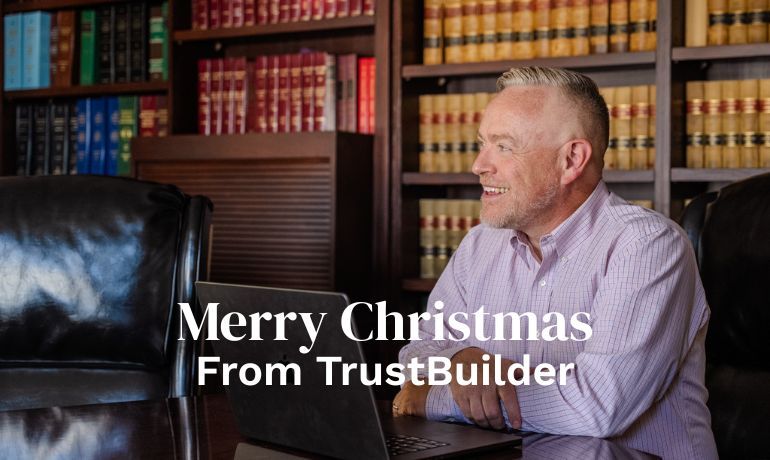8 Steps for Rebuilding Trust After a Conflict
Conflict in the workplace is, unfortunately, almost inevitable. Whether it stems from work pressure, personal stress, miscommunication, unmet expectations, or cultural differences, conflict has the potential to damage relationships and erode trust between individuals, within teams, or among members of management.
That broken trust can cause serious organizational setbacks, but trust lost doesn’t have to be lost forever. When an incident happens that breaks trust, the best response is to address it; trying to ignore or minimize it can actually do additional damage to an organization’s trust framework. However, with the right strategies, organizations can repair relationships, restore confidence, and even emerge stronger than before.
At TrustBuilder, we help organizations navigate these difficult moments with tools and approaches designed to rebuild trust in meaningful and lasting ways. Our research and experience have helped us to pinpoint eight strategies that can help organizations rebuild trust after a conflict:
1. Acknowledge the Conflict Honestly
The first step in rebuilding trust is to face the conflict directly. Glossing over the issue or sweeping it under the rug only deepens resentment and feeds more distrust. Leaders and team members alike should acknowledge what happened and validate the impact it had not just on those involved directly, but on others in the organization. Honest acknowledgment signals respect and a willingness to move forward constructively, and it prevents tensions from escalating.
2. Take Responsibility, Acknowledge the Nature of the Error, and Apologize Sincerely
A genuine apology goes a long way in repairing broken trust. Taking responsibility for mistakes, misunderstandings, or poor behavior shows accountability and humility.
Generally, trust breaks down when someone misses the mark, drops the ball, or lets someone down in the areas of action, insight, or connection. The core of rebuilding trust is being there for others in the ways that matter most to them. This starts by acknowledging how you missed the mark, for example, by failing to take the needs or perspectives of others into account, or acting only in self-interest. Attuning to other people’s needs and preferences and moving toward them proactively is how the door for rebuilding trust gets cracked open.
Accordingly, apologies must be sincere. Empty words without real ownership or action can worsen the situation. A well-delivered apology demonstrates integrity and creates space for reconciliation. Further, you can bolster the apology by following up with action that reinforces the renewed commitment to collaboration and trust. Harboring a negative attitude or grumbling will sow discord and further distrust.
3. Listen Actively to All Perspectives
When trust has been shaken, people need to feel heard. Active listening means giving others space to express their concerns without interruption or defensiveness. Leaders and team members should practice empathy, ask clarifying questions, and focus on understanding rather than rebutting. At the same time, letting people communicate should not be cast as an invitation to air grievances or choose sides. Discussions should be focused, positive, and productive. The purpose of the listening process is to uncover the root of the conflict, resolve it, and rebuild mutual respect.
4. Clarify Expectations and Commitments
Conflicts often arise from mismatched expectations. Rebuilding trust requires clearly resetting expectations moving forward. Define roles, responsibilities, and goals in a way that all parties understand and agree upon. Setting clear commitments and following through on them establishes a stronger foundation for trust to rebuild and flourish.
5. Demonstrate Consistency Over Time
No matter how much you may think a disruptive conflict was more of a tempest in a teapot than a serious breach, it has real impacts; you cannot expect trust to be rebuilt overnight. Rebuilding trust cannot be accomplished with one act or action. It's the results of a series of consistent, attuned actions.
Importantly, rebuilding trust does not mean that you always have to act without self interest. You do, however, need to understand and value the interests of others in balance with your own transparent interests. It will require consistent, reliable actions that show a genuine commitment to improvement. Leaders and employees should focus on aligning words with actions, fulfilling promises, and modeling trustworthy behavior day in and day out. Over time, consistency rebuilds confidence.
6. Encourage Mediation or Facilitation When Needed
Sometimes rebuilding trust requires a neutral third party to facilitate conversations. Skilled mediators or facilitators can guide discussions, reduce tension, and create a safe environment for resolution. Third party involvement also gives other parties a sounding board they are comfortable confiding in, particularly if a conflict has left them wary of confiding in co-workers or supervisors. At TrustBuilder, our experts provide structured frameworks that help organizations navigate conflicts constructively, giving them an actionable roadmap for rebuilding trust networks that have broken down.
7. Focus on Shared Goals and Team Unity
Rebuilding trust isn’t only (or even primarily) about resolving past issues. It’s about how you move forward together constructively and productively. Refocus on common goals, shared values, and collective success. When individuals see themselves as working with others toward a unified objective bigger than themselves, collaboration improves and trust begins to grow again.
8. Provide Training on Trust-Building Skills
Conflicts can highlight skill gaps in communication, empathy, or cultural awareness, and can show you where your pain points are. Offering targeted training in these areas equips teams and managers with the tools to prevent similar issues from arising in the future. Investing in development shows employees that the organization is serious about building a healthy, trust-based culture.
Rebuilding Trust with TrustBuilder
At TrustBuilder, we understand that trust is fragile, but we also know that it’s resilient. Trust is not something that just “happens.” It requires intention and attention. With the right approach, even damaged or shaky relationships can be restored and strengthened. Using our individualized trust assessments, coaching, and workshops, we can provide organizations, leaders, and teams with actionable strategies to repair trust and move forward with confidence.
If your organization is facing the challenge of rebuilding trust after conflict, TrustBuilder can help. Contact us today to learn more or to schedule a consultation. Discover how to transform conflict into an opportunity for growth, stronger connections, and a renewed vision that can bring greater success to your organization.
Recent Posts


![SYNTHESIS [2026] in light blue text.](https://lirp.cdn-website.com/f969fb45/dms3rep/multi/opt/TB_Horizontal_White-b3af8ef2-1920w.png)









